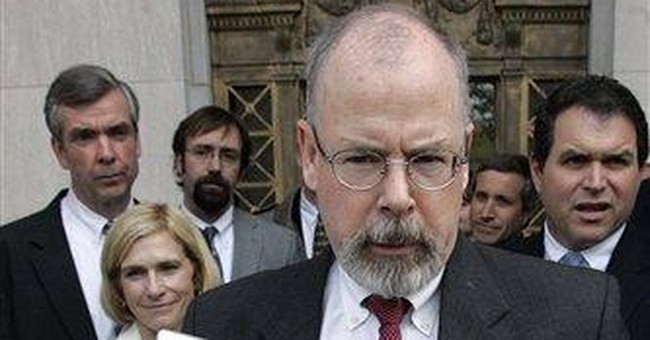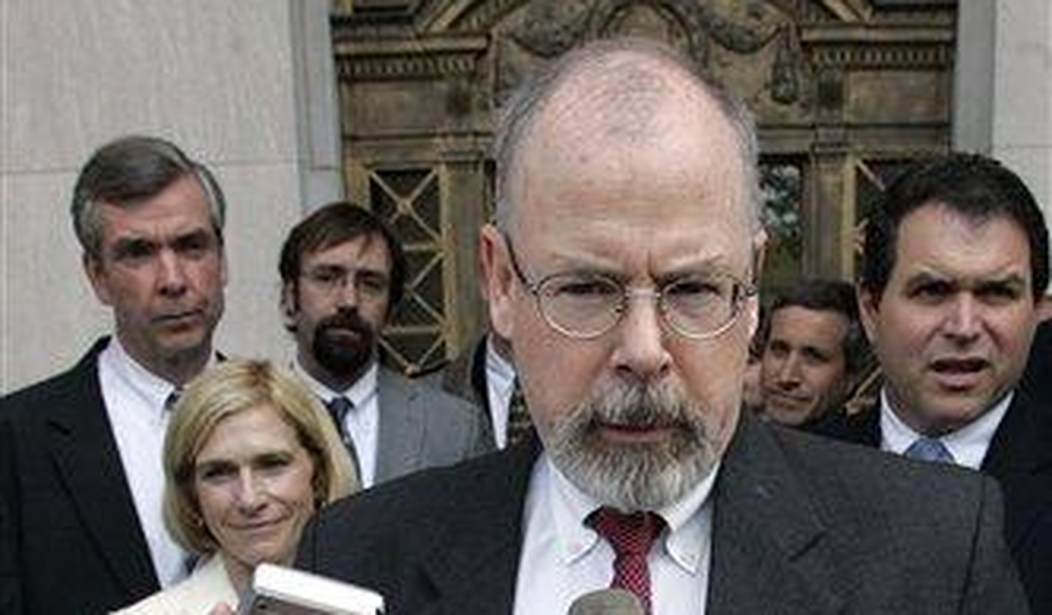
There has been a building sense of consternation on the internet and Twitter that US Attorney John Durham’s investigation of matters involving the Crossfire Hurricane (CH) investigation is not going to live up to the hype. Some are becoming resigned to the idea that the central players responsible for orchestration the flawed — and in many ways fraudulent — investigation of the Presidential candidate of the party out of power in the months ahead of an election, followed by a factually baseless continuation of that investigation to hog-tie the Trump Administration in its early years, will never be held to account for their conduct. The sentiment seems to be building that either Durham will delay too long, and if Trump loses the election the matter will forever remain buried, or that Barr and Durham will only issue a “Report” that might be embarrassing to those who carried out the scheme, but no one goes to jail while many cash in with their media gigs and book deals.
But, based on what I see and read against the backdrop of my time with DOJ, none of those fears square with what Attorney General Barr is doing.
Start with the fact that not only has he tasked US Attorney Durham from Connecticut with conducting a wide-ranging inquiry into the actions of several arms of the US and allied governments intelligence community. There has been very little insight into the resources that have been committed to Durham’s efforts. We don’t even know at this point if he has made use of the FBI given the role of FBI officials in the matters under scrutiny, or if he has made use of law enforcement resources from other federal agencies. Durham and Barr both pushed back publicly against the “narrative” that followed the IG Report which observed that it had not found any documentary evidence or admissions of political bias in the origins and pursuit of CH — each pointing out that the IG’s ability to evaluate that issue was much more constrained than Durham’s ability to do the same. Barr has also questioned the IG’s opinion — and it’s only an opinion — that CH was “properly predicated” under DOJ and FBI policies, based on Barr’s more fulsome understanding of all that was known at the time of the decision.
But if that was the sum total of what has happened over the past 18+ months since Barr became Attorney General, I might be concerned about the ultimate destination of the Durham investigation. But much more than that has happened.
We know that Barr returned to DOJ as Attorney General on the heels of writing a lengthy legal memorandum to DOJ questioning the developing narrative in the press that Pres. Trump was under investigation by the Special Counsel’s Office (SCO) for “obstruction”. I’m not going to attempt to breakdown his argument in that memo here — though that might be an interesting subject for another day.
But the drafting and submission of the memo clearly signaled that AG Barr did not recognize the latter stages of the SCO’s investigation — later reflected in Volume II of the Mueller Report — as a legally viable basis upon which to continue the investigation after the CH investigation turned up no meaningful evidence of crimes.
Attorney General Barr did not forget about his views on the “obstruction” angle pursued by the SCO. If the views reflected in Vol. II was truly the product of Robert Mueller’s thinking, it would surprise me that AG Barr would authorize an investigation into the process by which those views came to be published, due to his long-time close friendship with Robert Mueller.
In my view, AG Barr’s actions to pursue such an inquiry suggest to me that he sees Vol. II of the Mueller report as a work of partisan political actors — Obama Administration veterans of DOJ who pushed and pursued legally baseless theories as an exercise of partisan political “lawfare”.
As I have said here and on Twitter, the decision to divert a second US Attorney, Jeffrey Jensen from St Louis, away from the work in his district in order to examine a case handled by the SCO — the prosecution of General Flynn that ultimately led to a decision to drop that case on the basis that the prosecution was flawed from the outset likely by partisan political considerations — is an expression of how concerned AG Barr was about the SCO’s motives.
The Roger Stone sentencing was a more trivial matter, but it added to Barr’s concerns nonetheless. He publicly defended the prosecution of Stone based on the evidence of what Stone had done. But the transparency with which the SCO prosecutors on the Stone case so obviously “targeted” Stone — an unrepentant Trump supporter and opponent of the SCO efforts — for outrageous treatment at sentencing was simply another data point underlying Barr’s discomfort with the motivations of the SCO’s partisan staff of prosecutors.
Barr has stated publicly, without details, that he has given US Attorney Jensen further taskings. In my view, that means he has asked Jensen to examine some of the decision-making engaged in by the SCO over the nearly two years the office existed. To me, chief among the concerns would be the motivations to publicly announce and hold press conferences about the Russian Troll Farm case and the Russian Intelligence Officers case.
Both indictments in those cases reflect an “anti-Trump” bias in that they both fit the media narrative when they were announced that Russian influence efforts during the 2016 Presidential campaign were intended to help Donald Trump get elected, and the efforts had a meaningful impact on the race. Somewhere there is a paper trail – or individuals will need to answer questions — with regard to the decision to file those indictments publicly, and the contents of the indictments which were more about telling a “story” than they were about laying out a prosecutable criminal case.
A data point that contributes to the justification for the inquiry was the fact that the SCO ended up dismissing the indictment as to the one Russian company that appeared to defend itself, on the basis that it could not comply with discovery obligations while safeguarding classified information and “sources and methods”. If that was true when the case was dismissed, it was true when the case was filed. So the motivation for filing the case had to be something other than a bona fide intention to pursue it. Those are questions about which Jensen should be seeking answers.
Finally, we have the news in the last few days that US Attorney John Bash out of Houston, previously tasked with looking into the “unmasking” practices of various Obama Administration officials in the final 4-6 months prior to the Trump Administration taking office, is now also looking at the use of Sec. 702 inquiries under the Foreign Surveillance Intelligence Act, which are by law to be limited to foreign persons who are outside the United States at the time their communications are intercepted, monitored, and reviewed. We don’t have any window yet with regard to the nature of this investigation, but AG Barr has decided that a third US Attorney needed to be tasked with pursuing this angle.
That is a significant amount of resources to commit to this wide-ranging probe. If the result of Durham’s investigation was to be no indictments and only a report, nothing would have prevented AG Barr from using US Attorney Durham to pursue these other angles. He did not.
To me, that is an important point.
Attorney General Barr expects John Durham to be busy in the months ahead.














Join the conversation as a VIP Member